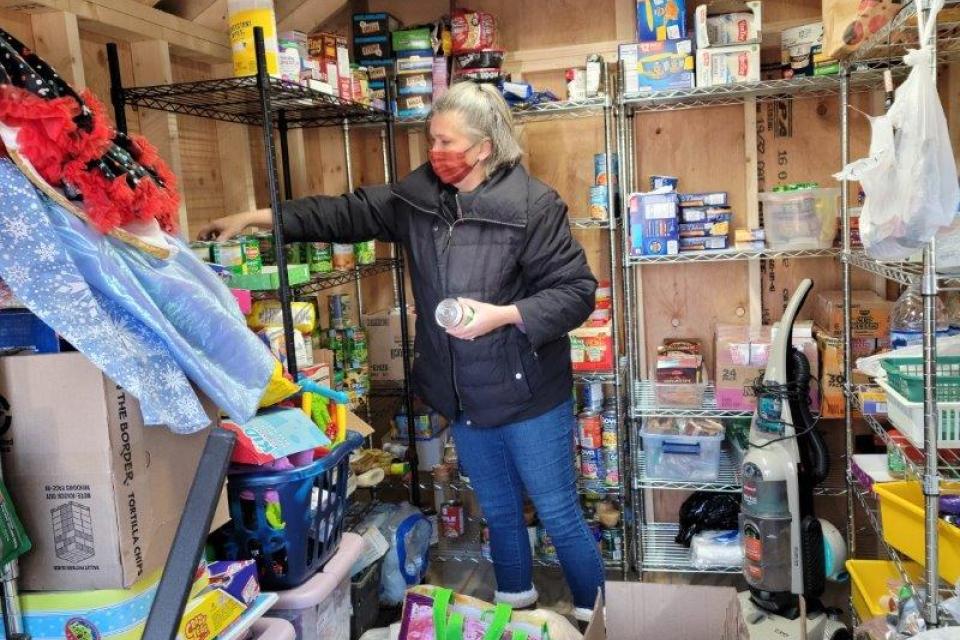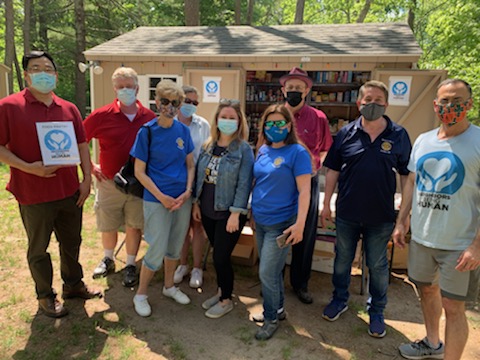
Neighbors Being Human – a community ministry of St. Andrew’s in Yaphank – goes far beyond meeting the immediate needs of neighbors. Program volunteers know the names and stories of all those they encounter, while parishioners have opportunity to embody the values of Christ.
Suffolk County is often known for being one of the wealthiest counties in the United States and for its burgeoning wine region. But tucked among the vineyards, horse farms, waterfront properties, famous residents, and historical sites, is Neighbors Being Human – a community ministry of St. Andrew’s Episcopal Church in Yaphank whose mission it is to “support to those facing food insecurity and homelessness and to ultimately help lift people out of poverty.”
The poverty in the surrounding area could be invisible if you choose not to look for it. Those without shelter stay in nearby 1- or 2-week Suffolk County owned and operated campgrounds, live in the woods, and do their best to move in with friends or family, if possible, in the winter months. An average of 58% of students in the William Floyd School District and 49% of students in the Longwood school districts have been categorized by the federal government as “Identified Students.” As a result of the high poverty level, all students in both school districts are eligible for free breakfast and lunch in school. Longwood and William Floyd school districts are in the top five largest school districts in Suffolk County.
Rich Ohlsen’s eyes were first opened to the enduring challenge of homelessness in his own community in a Facebook community page back in 2018. He learned from a neighbor’s post that she was trying to gather food and necessities for people living in surrounding parks. Rich turned to his parish – St. Andrew’s in Yaphank – eager to get involved and meet this glaring need. The church soon hosted a community meeting and developed a plan to respond.
Forming Strong Partnerships to Connect Suffolk County and Feed Neighbors in Need
Rich put forth the idea of “Blessing Boxes,” as his brother read about a similar project in Columbus, Ohio. Each Blessing Box acts as 24-hour, 7-day a week food pantry. Volunteers from St. Andrew’s started off with two Blessing Boxes in county parks after meeting with their local legislator to get a county resolution passed to ensure cooperation.
Currently, there are nine boxes in various neighborhoods stocked and checked on a regular basis by community partners:
Blydenburgh County Park in Smithtown, maintained by the Smithtown Food Pantry
Riverhead, maintained by Centro Franciscano
Yaphank, maintained by Rich’s parish, St. Andrew’s
Wading River, maintained by St. Anslem’s Episcopal Church in Shoreham
Center Moriches, maintained by St. John the Baptist Episcopal Church
Farmingville, maintained by Farmingville Civic Association
Cathedral Pines County Park, Southaven County Park, and Indian Island County Park, all jointly maintained by volunteers from an Independent Group Home Living (IGHL) day care program at Suffolk Country Farm and RISE Life Services.
This spring, an additional blessing box will be added to Sears Bellows County Park in Hampton Bays.
Last year, the Long Island Passport Rotary Club reach out to Rich to see how they could be involved with the program. The Passport Rotary Club serves the same constituents as the Episcopal Diocese of Long Island: all of Brooklyn, Queens, Nassau, and Suffolk. Volunteers from across the island – everywhere from Brooklyn to Montauk – are involved. The Passport Rotary Club took on the heavy lift of getting to know those in the campgrounds because the volunteer work can be labor intensive for the limited number of volunteers. With the additional support and volunteers from the Passport Rotary Club, a sense of community is being fostered in the campgrounds and Neighbors Being Human is better able to meet the needs of the people living in the campgrounds.
Calling Each Person by Name: Upholding the Dignity of Each Person by Knowing their Story and Unique Needs
Due to the success and regular use of the boxes, St. Andrew’s was moved to open a food pantry just before the start of the pandemic, which only exacerbated the need. Each day the pantry is open, volunteers greet roughly 15 people by name. Each person coming to the pantry can collect food for their entire family. Because the average family size is about five people, the pantry feeds roughly 50-75 people each day it is open.
Volunteers at St. Andrew’s make it a priority to know the families by name and serve without judgement. Regular visitors at the pantry come for social connection as well as food. Volunteers remember their birthdays and ensure their children have Christmas gifts, sometimes provided from St. Andrew’s bustling thrift store. Because strong relationships are fostered over the course of months and years, Neighbors Being Human now maintains a significant database of contact information, allowing them to get information about the pantry, thrift store, and blessing boxes to those who need it extremely efficiently.
This streamlined connection works both ways – Rich also gets messages directly from people who need urgent assistance. Mary,1 a regular at the pantry, struggles with addiction and left her group home due to the presence of drugs. After an accident that totaled her car, she texted Rich asking if he could have a volunteer bring food to her, as she was no longer able to travel to collect it.
Because Rich and Mary know each other well, she was able to have food delivered to her, but the connection runs so much deeper than a few meals. Mary's fellowship with the volunteers at Neighbors Being Human means that she has a community to turn to when life throws another obstacle in her path. There are people who care about her, who will reach out to her if she doesn’t come to the pantry, and who can offer her help in times of crisis.
One of the first families to regularly visit St. Andrew’s was an elderly couple that was forced to make a devasting decision: continue to pay their mortgage and utilizes or pay for the husband’s cancer treatment. This couple sold their home and used the earnings to purchase a heavily used camper and pay mounting medical bills. They now live in local campgrounds as the husband continues cancer treatment.
Another common trajectory of people frequenting the pantry are families that had their rent raised so significantly that they could no longer afford to stay in their home or apartment. Without having the savings accrued to lease a more affordable accommodation, many families chose to live campers. One elderly couple decided instead to live in their van at a rest stop off the Long Island Expressway during the winter months and spend the summer in a tent.
A Church for the Broken: Challenging Parishioners to Embody Christ’s Compassion
Occasionally, someone visiting the food pantry will begin to also frequent the parish for mass, though this is not the goal of the program. Rich feels strongly that providing services is not meant to fill the pews. “I don’t care if one person from the food pantry comes to the church. We’re serving people because it’s our mandate as Christians to do so.”
Rich also recognizes that members of the parish may feel their faith being challenged when a regular visitor at the pantry sits in the pew beside them.
The Future of Neighbors Being Human
Rich has hopes and ambitions to scale Neighbors Being Human so that the organization can meet both long- and short-term needs – eventually lifting people out of poverty through continued care and support. A long-term goal is to provide social workers to help navigate the complex network that can help these families get out of poverty. In his years of experience navigating this network, Rich notes that there is a “lack of a social safety net in the east end of Long Island.”
Neighbors Being Human remains a small organization and its current challenges are finding committed volunteers, funding to scale programming, and the lack of a dedicated office space. St. Andrew’s location within a historic and watershed protection area limit what can be built on the property. Neighbors Being Human operates out of three sheds, and very often overruns the parish hall, which is home to several other ministries.
You can support Neighbors Being Human by making a financial gift or purchasing an item of their Amazon Wishlist. If you’re a resident of Suffolk County and interested in getting involved, please email info@NeighborsBeingHuman.com.
Episcopal Ministries of Long Island is proud to support Neighbors Being Human and is grateful for their work bringing Christ’s love to their community across Suffolk County.
